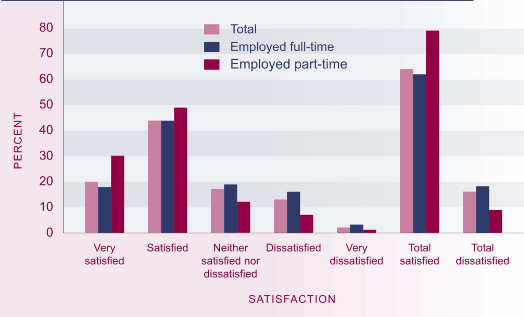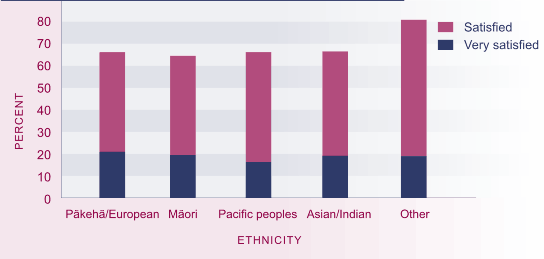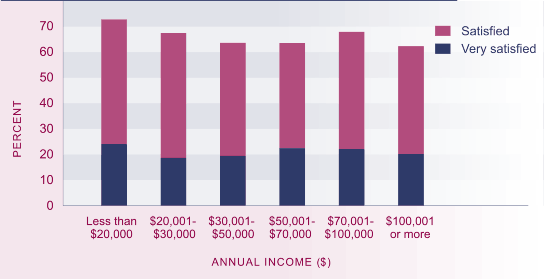Satisfaction with work-life balance
Definition
The proportion of employed people who are "satisfied" or "very satisfied"
with their work-life balance, as reported in the Quality of Life in New Zealand's Largest Cities Survey 2004.
Relevance
It is important that people find a balance
between paid work and other aspects of life. When this balance is not found
people can find themselves suffering from stress or anxiety. Long working
hours or non-standard working hours (eg night shifts) may compromise work-life
balance.
Current level and trends
Results from the Quality of Life in New Zealand's Largest Cities Survey 2004 indicate that most employed New Zealanders (66
percent) are "satisfied" or "very satisfied" with their work-life balance.
People in part-time employment (79 percent) are more likely to be "satisfied"
or "very satisfied" with their work-life balance than people in full-time employment
(62 percent).
Figure PW5.1 Satisfaction with work-life balance, by employment status,
2004

Source: Auckland City Council et al (2005) Quality of Life in New Zealand's Largest Cities
Age and sex differences
Those least likely to be satisfied with
their work-life balance are people aged 15–24 years (65 percent) and those aged 25–49 years
(64 percent). Females (69 percent) are more likely to report being satisfied
with their work-life balance than males (64 percent). This difference partly
reflects the fact females are more likely than males to be in part-time work.
Among full-time workers, males (63 percent) and females (62 percent) report
similar levels of satisfaction with their work-life balance.
Ethnic differences
Those of "Other" ethnic groups report the highest
levels of satisfaction with work-life balance (81 percent). There is little
difference between the remaining ethnic groups, with 66 percent of Pākehā/European, Pacific peoples and Asian/Indians and 64 percent of Māori reporting satisfaction with work-life balance.
Figure PW5.2 Satisfaction with work-life balance, by ethnicity, 2004

Source: Auckland City Council et al (2005) Quality of Life in New Zealand's Largest Cities
Personal income differences
Employed New Zealanders whose personal incomes
are less than $20,000 are the most likely to be satisfied overall with their balance
of work and life (73 percent). This group includes many women who work part-time.
Figure PW5.3 Satisfaction with work-life balance, by personal income,
2004

Source: Auckland City Council et al (2005) Quality of Life in New Zealand's Largest Cities
Regional differences
Satisfaction with work-life balance
varies across cities. Those with the highest levels of satisfaction lived in Wellington (70
percent). Auckland City and Hamilton recorded the lowest levels of satisfaction (62 percent).
|



